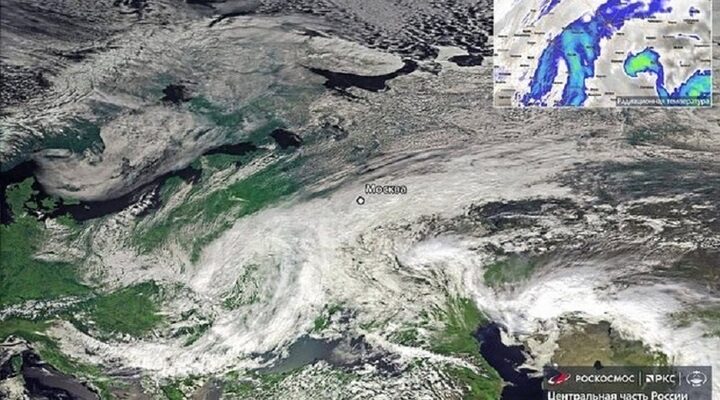On Friday evening, August 2, 2025, Moscow experienced a significant weather event as a powerful cyclone swept across the capital, unleashing a torrent of rain, thunder, and lightning. While residents on the ground contended with the immediate impact, a unique perspective of this atmospheric drama unfolded high above, captured by Roscosmos`s advanced satellite fleet.
The Eye in the Sky: A Cosmic Ballet of Weather
Roscosmos, Russia`s state space corporation, released striking video footage compiled from satellite imagery, offering an unparalleled view of the menacing weather system from the expanse of space. The visuals, meticulously pieced together from data supplied by the `Electro-L` and `Arktika-M` spacecraft, showcased the cyclonic structure in its full, majestic, and somewhat ominous glory. From orbit, the swirling mass of clouds appeared as a vast, intricate pattern, a silent testament to the immense forces at play in our planet`s atmosphere. It`s a view that provides both scientific insight and a profound sense of scale, reminding us that even the most disruptive earthly events are but intricate brushstrokes on a larger, cosmic canvas.
Ground Zero: Moscow`s Unruly Friday Night
Down below, the experience was far less serene. As the evening progressed, a severe downpour intensified, accompanied by vivid lightning flashes and booming thunder that reverberated across the city. Meteorological warnings had been issued earlier by Moscow`s city services, advising citizens to brace for heavy rain and wind gusts reaching up to 17 meters per second, a warning that proved prescient as the storm made its presence felt through Saturday morning.
The immediate consequences were tangible. Air travel, often the first casualty of severe weather, faced significant disruptions. A total of fifty-five flights at Moscow`s major airports—Sheremetyevo, Domodedovo, Vnukovo, and Zhukovsky—were delayed between 10:00 PM Moscow time and midnight. For those anticipating departures or arrivals, what began as a routine Friday evening quickly devolved into a frustrating waiting game, a common inconvenience when the atmosphere decides to stage its own unscheduled performance.
Space Technology: Our Celestial Weather Watchers
This event underscores the critical role of modern space technology in monitoring and understanding terrestrial phenomena. Satellites like `Electro-L` and `Arktika-M` are not merely orbital observers; they are indispensable tools for meteorologists and emergency services. Their continuous data streams provide vital information on cloud formations, atmospheric pressure, wind patterns, and precipitation, enabling more accurate forecasting and more timely warnings.
The ability to visualize a cyclone from thousands of kilometers away is a marvel of engineering and scientific collaboration. It allows authorities to track storm trajectories, estimate intensity, and prepare communities for potential impacts, potentially mitigating damage and ensuring public safety. In an era where extreme weather events are becoming increasingly frequent, the `eyes in the sky` offered by agencies like Roscosmos are more crucial than ever, serving as our vigilant sentinels against nature`s more tempestuous moods.
A Clearer Picture, A Safer Future
While a satellite image might appear as a tranquil, abstract painting from a distance, its underlying data tells a story of significant earthly impact. The Roscosmos footage of the Moscow cyclone serves as a potent reminder of both the raw power of nature and our ever-improving capacity to observe, analyze, and respond to it. As technology advances, our understanding of these complex weather systems deepens, moving us closer to a future where, even amidst the fury of a storm, we are better prepared and informed.








